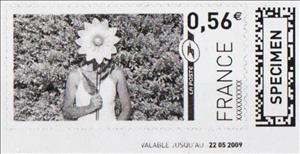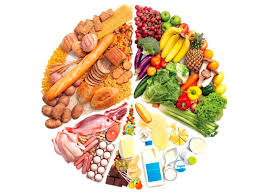Stamp: Women holding a sort of sunflower on a stick (France 2009)
Women holding a sort of sunflower on a stick (France 2009)
01 January (France ) within release MonTimbrEnLigne. Nature and Landscapes goes into circulation Stamp Women holding a sort of sunflower on a stick face value 0.56 Euro
| Stamp Women holding a sort of sunflower on a stick in catalogues | |
|---|---|
| Colnect codes: | Col: FR-TIM 2009-168 |
Stamp is square format.
Specimen to be replaced by valid stampAlso in the issue MonTimbrEnLigne. Nature and Landscapes:
- Stamp - Crocuses face value 1.65;
- Stamp - More Autumn Leaves face value 0.56;
- Stamp - River Torrent face value 0.56;
- Stamp - Cherry Tree face value 0.56;
- Stamp - Forest. looking up into the canopy face value 0.56;
- Stamp - Trees in the autumn by a lake face value 0.56;
- Stamp - Horse chestnut leaves face value 0.56;
- Stamp - Pink Flowers maybe cherry blossom face value 0.56;
- Stamp - Tropical Beach 3 face value 0.56;
- Stamp - Orange and yellow flowers face value 0.58;
- Stamp - Frangipani (Plumeria) face value 0.55;
- Stamp - Snow Topped Mountains in black face value 2.30;
- Stamp - Women holding a sort of sunflower on a stick face value 0.56;
|
Data entry completed
50%
|
|
|---|---|
| Stamp Women holding a sort of sunflower on a stick in digits | |
| Country: | France |
| Date: | 2009-01-01 |
| Emission: | Personalized - Official |
| Format: | Stamp |
| Face Value: | 0.56 Euro |
Stamp Women holding a sort of sunflower on a stick it reflects the thematic directions:
Food is any substance consumed by an organism for nutritional support. Food is usually of plant, animal, or fungal origin and contains essential nutrients such as carbohydrates, fats, proteins, vitamins, or minerals. The substance is ingested by an organism and assimilated by the organism's cells to provide energy, maintain life, or stimulate growth. Different species of animals have different feeding behaviours that satisfy the needs of their metabolisms and have evolved to fill a specific ecological niche within specific geographical contexts.
In botany, a berry is a fleshy fruit without a drupe (pit) produced from a single flower containing one ovary. Berries so defined include grapes, currants, and tomatoes, as well as cucumbers, eggplants (aubergines), persimmons and bananas, but exclude certain fruits that meet the culinary definition of berries, such as strawberries and raspberries. The berry is the most common type of fleshy fruit in which the entire outer layer of the ovary wall ripens into a potentially edible "pericarp". Berries may be formed from one or more carpels from the same flower (i.e. from a simple or a compound ovary).: 291 The seeds are usually embedded in the fleshy interior of the ovary, but there are some non-fleshy exceptions, such as Capsicum species, with air rather than pulp around their seeds.


